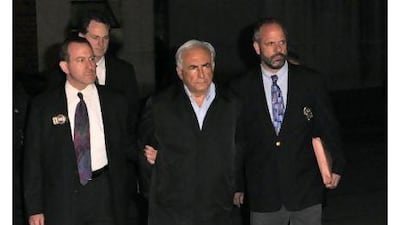A poll shows that almost six in 10 people surveyed in France are inclined to believe Dominique Strauss-Kahn, the International Monetary Fund chief accused of trying to rape a hotel chambermaid in New York, is the victim of a conspiracy.
The telephone poll, which surveyed 1,007 people on Monday, was conducted by the CSA polling institute on behalf of three media organisations. It appears to support a widespread belief in France that the man who hoped to become the country's next president was somehow set up.
In all 57 per cent of those questioned responded that a plot was "certainly" (22 per cent) or "probably" (35 per cent) behind Mr Strauss-Kahn's downfall. Just 32 per cent felt there was no conspiracy and the remaining 11 per cent offered no view.
Among supporters of the French socialist party, for which he had been strongly fancied to win the 2012 presidential election, the total proportion believing a conspiracy was possible rose to 70 per cent. No separate results were given for supporters of other political parties, but CSA says it polled a nationally representative sample in terms of age, gender and occupation.
The results coincide with a wave of anti-American sentiment that has swept France. The US-bashing has been driven by images of the accused doing what Americans call "the perp walk", when an alleged perpetrator of crime is escorted out of a police station in handcuffs and put on show to waiting cameras.
Those pictures have shocked the French, where the rights of suspects are more jealously guarded.
"The intent is to humiliate, which is completely incompatible with the idea of the presumption of innocence," was a typical comment in street interviews for the website of the daily newspaper Le Parisien.
However, the poor impression created in France by the US authorities treatment of DSK, as he is commonly known, appears to be a separate issue to the suspicion of conspiracy.
Respondents in the opinion poll were not asked whether they thought those behind such a plot were political enemies at home or shadowy figures from international finance. They were simply asked whether they thought Mr Strauss-Kahn was the victim of a conspiracy.
Among the first French public figures to voice scepticism was Christine Boutin, the leader of France's Christian Democrats, who said she believed "somebody set a trap for Dominique Strauss-Kahn to fall into". But she offered no clue as to the supposed source of conspiracy.
Philip Gourevitch, blogging from Paris for the New Yorker, pointed out that there was no shortage of candidates: "(President Nicolas) Sarkozy, of course, or socialist rivals, or else, I heard someone say, the Russians who are unhappy with how he has dealt with them at the IMF, or maybe the Greeks, whose economy has self-destructed almost as thoroughly as he now has."
For Franco-American relations, the problem is that the conspiracy theories have become mixed up with dismay at the public humiliation of DSK. This is hardly surprising, since France's relations with the US can best be described as complicated.
On one side of the Atlantic, France's refusal to involve itself in the Iraq conflict was seen as the limp response of "cheese-eating surrender monkeys", a phrase coined by the writers of The Simpsons animated TV series. On the other is the notion, which was certainly encouraged by Jacques Chirac when president, that French language, culture and practices must be protected from "Anglo-Saxon" influence.
Yet Americans flock to Paris and the Riviera while the French have an abiding passion for Hollywood blockbusters and westerns and are among the world's most gluttonous consumers of fast food from McDonald's.
Against the background of mutual misunderstanding, the way people are handled when accused of serious criminal behaviour can be seen as just one more issue to divide them.
"I admire American democracy," said the veteran French socialist politician Jack Lang, a former minister of culture. "But I know … the US judicial system, which may be an infernal machine. Whatever the truth of the matter, there is nothing to justify a man being treated with contempt and duress."
Elisabeth Guigou, a former justice minister, said she found the images "disgusting" and a violation of human dignity.
But French public opinion may well change if emerging details continue to damage the case of Mr Strauss-Kahn, whose reputation for womanising, not always conducted with great subtlety, has become fair game for French as well as foreign media.
"There is a sense of denial on the part of the French with regard to this scandal," said Jérôme Sainte-Marie, political director of the CSA pollsters. "They don't want to believe it and that is interesting in terms of collective psychology. But it is an impulsive reaction and the feelings of incredulity may blur as the investigation proceeds."
From one French media source, the alternative news website 24heuresactu.com, has already come a robust defence of American handling of the case, and sharp criticism of those in France who have "minimised the accusations of a young immigrant chambermaid against one of the most powerful men on the planet".
Despite the "hypocritical indignation" of some socialists and commentators, it said, the New York police had shown, by treating Mr Strauss-Kahn as a "mere nobody", a lesson in judicial independence that France could do well to ponder.


